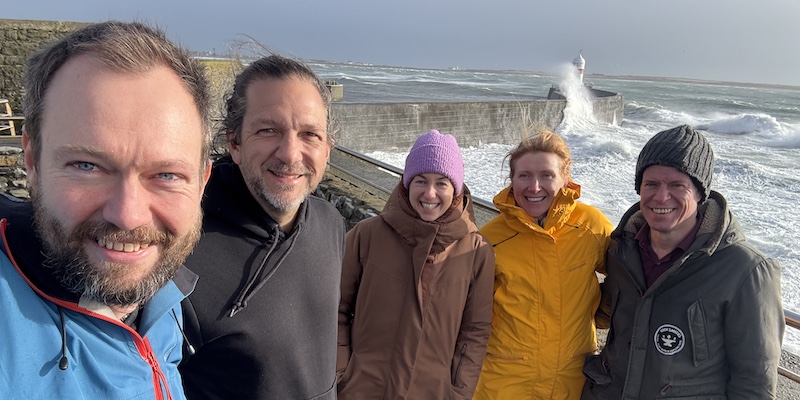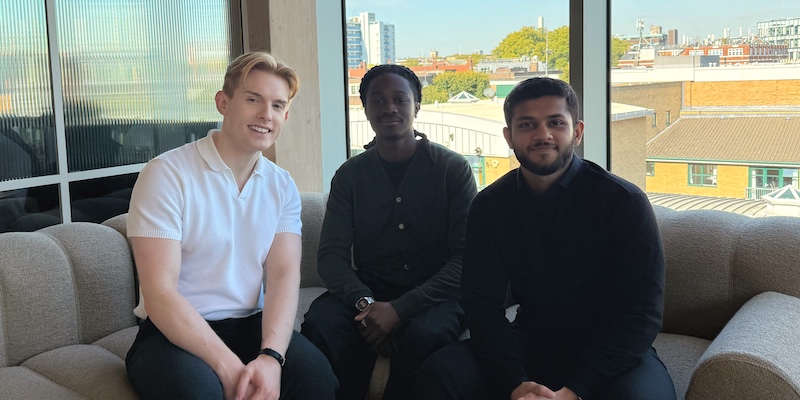
10 Questions with Inhabit
Inhabit believe businesses should think about climate consciousness, the same way they think about “any other strategic pillar, whether that’s growth goals, operational efficiency, or cultivating a great culture within a workplace.”
BGV first invested in Inhabit in Autumn 2019. Their product has evolved and developed during this time, but at the heart of it, their motivations have always been around finding a solution to the lack of accessible climate action.
Today their offering consists of an Active Climate Toolkit for small businesses looking to move to net zero. Their toolkit enables companies to Measure, Reduce, Report and Integrate climate actions and impact into their organisations.
We have previously written about the increasing interest in ClimateTech, from governments, asset managers, and business leaders alike. Inhabit is riding the wave of this growing awareness, and enthusiasm, about the need to create real change. Having already raised $270,000, they are in the process of closing their seed round.
We sat down with Chief Product Officer and Co-Founder Sam McKay to chat about their ambitions for the future, as well as exciting opportunities to join the Inhabit team. He also shared some advice for aspiring entrepreneurs, spoiler - sometimes taking a step back for a moment can be the best thing you can do.
The following conversation has been edited for length and clarity. You can watch the full interview here.
Where did the idea for Inhabit come from, where did your startup journey begin?
My co-founder Cam and I have always been interested in exploring the use of technology to solve problems, and at other companies we had experienced problems around the lack of accessible climate action. What started as a carbon compensation subscription service to give people a simple route into climate action, has evolved a lot since then. The more research we did, the more we got to the heart of the problem: Truly understanding what the impact of your business is, and where that impact is coming from. The concept has changed and evolved so much over the last couple of years, but that's how it all began.
What do you hope Inhabit will change?
In one sentence: the way people think about and make business decisions. I think doing a carbon audit, or a carbon accounting exercise is one thing, and is that necessary first step. But really, that's just the sort of the front door to climate action. We want to shine a light on the fact that each business decision has an associated impact to it. We want to bring that to the fore, and embed climate consciousness into the heart of the decision making process - just as much as any other strategic pillar, whether that's growth goals, operational efficiency, or cultivating a great culture within a workplace. We think climate goals and considerations should be a part of this line of thinking.
Who are you hoping Inhabit will help?
From a high level perspective, SMEs or predominantly digital businesses, as that's where our original experience came from. It really is a more accessible way for businesses to understand their impact, and an alternative to the more costly climate consultancies that were available in the market already. But essentially, any business that wants to put climate at their core, and embed a climate strategy into their business. Those who don't know where to start, or what to do, or what good looks like! We're still at the beginning of our journey as well. We’re starting by targeting those that want to lead on climate early, and also want to help shape Inhabit into the leading climate solution that we hope to be.Businesses have a really important role to play, even beyond their own footprint. There is a real network or ripple effect that is more powerful, and perhaps a little less quantifiable. They can be a leading light for their employees, and that has a natural trickle down effect.
What makes Inhabit different from anything else out there?
There are a number of startups and more established businesses with their own take on climate management. Our real focus is on decarbonisation. The carbon accounting and measurement process is a very hot topic at the moment, but as mentioned previously, that is just the front door to real climate action. For us, it's about delivering decarbonisation at scale, as opposed to a carbon audit or offsetting and getting a carbon neutral badge. It's more into the depths of the business and really working out where that impact is coming from and what sort of changes and policies they can implement to reduce that.
Are there any success stories you can share about the impact you have had on your users?
We’ve been building a long-term relationship with a London based co-working space, which initially started as our core offering of measuring that footprint and implementing a reduction strategy, along with climate target setting. This has evolved into a deeper service, and we are supporting them with their wider sustainability strategy: committing to working only with ethical suppliers and developing the framework for what an ethical supplier assessment looks like, as well as helping them support the impact reduction of their members. These kinds of network or ripple effects result in massive impact, and it's definitely something that we're really proud to be a part of.
What’s one thing you wish you had known at the beginning of your startup journey?
It's hard to say just one thing. There are many, many things I wish I'd known. The big one is probably that there's always tomorrow. And It is okay to fail. I think there's been a number of occasions where you think you've been too ambitious, you're never going to get there. But just focus on the next task, the next goal, the next milestone, and then when you look back over six months or a year later, you'll be really surprised by how far you've come.You can lose that perspective. It's such an intense long journey, that it's quite hard to come up to breathe. You have to clear your thinking, and things get a bit more obvious. Sometimes stepping back for a moment can almost be the best thing you can do.
What three qualities make a successful founder?
I wish I knew! I think one thing I would say is that founders or leaders are made and not born, and it's quite hard to distil it down to three things. They do come in all different shapes and sizes. If you take myself and Cam as an example, we are completely different people with a completely different take on things, and different attributes. What we have in common is to really be open to learning along the way, don't be too precious about what you think you know. There's a famous quote, that it’s not what you don't know that gets you into trouble, it’s what you know for sure that just ain't so. I think that's definitely a good thing to bear in mind.The two others are both around the team. Support the team above all else, they are hands down the most important asset or commodity that you have. Make sure you surround yourself with a team that complements you and each other. That’s very crucial.It’s worth bearing in mind that it doesn't happen overnight, and you just keep working away.
Aside from Inhabit, are there any other tech for good companies you admire?
Yes! Thriva - they are a preventative health care company. They're putting better health in people's hands, and empowering people with health information to support preventative health care in an age where chronic conditions put such a big burden on the NHS and health systems at large, and they're doing great things. Aside from what they're doing, their founders have been particularly supportive and helpful for us. They're definitely a team we look up to and have a lot of admiration for.There's so many great companies out there in the climate space. Patch.io are making niche or nascent carbon removal technologies accessible to fund the development of carbon removal at scale. It's a really interesting area. We're actually working to integrate their offering on our platform as well.
If someone wanted to find out more about Inhabit and the space you are operating in, where would you signpost them?
They could come and talk to us, we'd be happy to talk as long as you'd like - and probably a bit longer than that. In terms of resources, the GHG Protocol is the framework for the global standard for measuring and managing carbon emissions, they have lots of good resources. SBTI, or the Science Based Targets Initiative, define and promote what a robust climate target looks like, with again lots of resources on their website. There is a wealth of information out there, I think that the struggle is distilling that down into digestible and actionable chunks, which is hopefully where we come in.
What’s next for you and Inhabit and how can people help?
We're in the process of closing our Seed round. It’s an extremely exciting as well as challenging time. Our next step is to build an amazing team that will get us closer to our vision and start to make a dent in decarbonizing the UK SME sector. You can help by talking about us to your friends, co-workers, and family. We have positions open and that next phase of recruitment will be really pivotal. If you're passionate about climate tech in general or our mission, you can help us by joining us! Feel free to reach out, we'd love to chat to anyone who is interested.
If you are an aspiring tech for good founder, you can register your interest to speak with the BGV team about your venture here via the ‘talk to our team’ button. You may also be interested in joining our Tech for Good slack, which is a great place to meet like-minded people, and sign up to our Tech for Good Compass to receive resources and updates aimed at aspiring tech for good founders.





